
Chalcogenide Letters
metrics 2024
Unveiling the Potential of Chalcogenide Materials
Introduction
Chalcogenide Letters is a prominent academic journal dedicated to the rapidly evolving field of chalcogenide materials, emphasizing their electronic, optical, and magnetic properties. Published by VIRTUAL CO PHYSICS SRL in Romania, this journal has established itself as a crucial source of scholarly research since its inception in 2006, with a convergence period extending to 2024. Although currently classified under the Q3 quartile in various categories including Chemistry (miscellaneous), Electronic, Optical and Magnetic Materials, and Physics and Astronomy, it serves as a platform for innovative research and discussions, attracting contributions from a global network of researchers and professionals. This journal presents an excellent opportunity for academics and students alike to engage with contemporary studies and breakthroughs in chalcogenide science. While it operates on an open-access model, the lack of an impact factor does not diminish its potential; rather it highlights the journal's commitment to serving the scientific community in a competitive landscape. With Scopus rankings positioning it in the lower percentiles across several categories, Chalcogenide Letters continues to evolve and expand its influence within the scientific discourse of materials science.
Metrics 2024
 0.24
0.24 1.20
1.20 1.00
1.00 35
35Metrics History
Rank 2024
Scopus
IF (Web Of Science)
JCI (Web Of Science)
Quartile History
Similar Journals

SEMICONDUCTORS
Exploring the depths of atomic and molecular physics.SEMICONDUCTORS, published by PLEIADES PUBLISHING INC, is a prominent journal that provides a platform for researchers and professionals in the fields of Atomic and Molecular Physics, Condensed Matter Physics, and Electronic, Optical and Magnetic Materials. With an ISSN of 1063-7826 and an E-ISSN of 1090-6479, the journal has been diligently disseminating knowledge since its inception in 1996 and continues to pave the way for innovative research until 2024. Although currently unclassified in the Open Access model, its influence is underscored by its rankings in Scopus, where it ranks in the 21st-22nd percentile across critical scientific categories. SEMICONDUCTORS serves as an essential resource for cutting-edge research, fostering a greater understanding of semiconductor materials and their applications, thereby assisting the scientific community in pushing the boundaries of technology and innovation.

Crystals
Illuminating the World of Crystals Through ResearchCrystals is a premier open-access journal, published by MDPI since 2011, that focuses on the multidisciplinary fields of chemical engineering, condensed matter physics, inorganic chemistry, and materials science. With its E-ISSN 2073-4352, the journal is headquartered in Switzerland, and actively contributes to the global scientific community by facilitating the dissemination of high-quality research. Ranking in the Q2 quartile across multiple categories, including Chemical Engineering (miscellaneous) and Materials Science (miscellaneous) for 2023, Crystals provides a platform for innovative studies that span from fundamental research to practical applications. The journal's commitment to open access ensures that groundbreaking findings are readily available to researchers, professionals, and students alike, fostering an environment of collaboration and knowledge sharing that is essential in advancing the scientific understanding of crystalline materials.
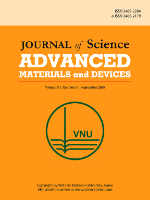
Journal of Science-Advanced Materials and Devices
Catalyzing Knowledge in Advanced Materials and DevicesJournal of Science-Advanced Materials and Devices is a leading open-access journal published by Vietnam National University, dedicated to advancing the field of materials science through cutting-edge research and innovative developments. Since its inception in 2016, this journal has become a pivotal platform for sharing insights and discoveries in various subfields, including biomaterials, ceramics and composites, and electronic, optical, and magnetic materials. With impressive quartile rankings, including Q1 across multiple categories in 2023, and a notable Scopus ranking placing it in the top 15th percentile for ceramics and composites, it highlights the journal’s influence and prestige within the global academic community. Open Access since its launch, the journal aims to facilitate unrestricted dissemination of scholarly work, empowering researchers, professionals, and students to engage with the latest advancements. The Journal of Science-Advanced Materials and Devices is vital for those seeking high-quality contributions that influence both theoretical understanding and practical applications in the ever-evolving landscape of materials science.

Physics and Chemistry of Solid State
Pioneering Discoveries in Physics and Chemistry of Solid-StatePhysics and Chemistry of Solid State is a distinguished open access journal published by Vasyl Stefanyk Precarpathian National University in Ukraine, dedicated to advancing research in the fields of condensed matter physics, materials science, and physical and theoretical chemistry. Since its inception in 2000, the journal has provided a platform for the dissemination of innovative ideas and original research findings, contributing significantly to the global scientific community. With a variety of access options, it facilitates the sharing of knowledge and collaboration among researchers worldwide. The journal has garnered recognition with respectable rankings in Scopus, positioning itself among the significant publications in its domain, particularly noted for its contributions to materials science and condensed matter physics. As it moves through its converged years from 2018 to 2024, Physics and Chemistry of Solid State aims to foster interdisciplinary dialogue and prepare the next generation of scientists to tackle complex challenges in solid-state research.
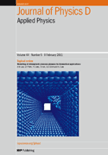
JOURNAL OF PHYSICS D-APPLIED PHYSICS
Connecting Researchers to the Pulse of Applied PhysicsJOURNAL OF PHYSICS D-APPLIED PHYSICS is a prestigious peer-reviewed journal published by IOP Publishing Ltd, dedicated to advancing the field of applied physics since its inception in 1967. With an impressive impact factor that reflects its standing in the academic community, this journal occupies Q1 and Q2 rankings across various categories including Acoustics and Ultrasonics, Condensed Matter Physics, and Electronic, Optical and Magnetic Materials, underlining its vital role in disseminating significant research findings. The journal aims to publish high-quality original research articles, reviews, and technical notes, providing a platform for professionals, researchers, and students alike to explore a broad spectrum of topics within applied physics. With a commitment to accessibility, articles are made available for readers around the globe, ensuring that groundbreaking discoveries reach a wide audience. Located in the United Kingdom, at TEMPLE CIRCUS, TEMPLE WAY, BRISTOL BS1 6BE, the journal continues to push the boundaries of knowledge in physical sciences, making it an essential resource for anyone involved in this dynamic field.

Computational Condensed Matter
Fostering Collaboration in Condensed Matter ResearchComputational Condensed Matter, a reputable journal published by Elsevier, serves as a critical platform for advancing the understanding of condensed matter physics and related fields. Since its inception in 2014, the journal has become a pivotal resource for researchers and professionals dedicated to exploring electronic, optical, and magnetic materials, as well as materials chemistry and general materials science. With its current standing in the Q3 quartile across multiple categories in 2023, it ranks within the 60th percentile for Materials Science (miscellaneous) and the 54th percentile for Condensed Matter Physics in Scopus, reflecting its growing influence and relevance in the scientific community. The journal aims to publish high-quality, peer-reviewed articles that can foster innovation and collaboration in computational methods applied to condensed matter systems. Researchers interested in cutting-edge insights and methodologies will find Computational Condensed Matter to be an invaluable addition to their academic resources. For those seeking to contribute to or stay informed about the latest advancements in the field, this journal is a must-read.

Journal of Physical Science
Empowering the scientific community with cutting-edge discoveries.Journal of Physical Science is an esteemed publication dedicated to advancing the knowledge in the fields of physical science, specifically in the realms of Materials Science and Physics and Astronomy. Published by UNIV SAINS MALAYSIA, this journal serves as a vital platform for researchers and professionals seeking to disseminate their findings and engage with the scientific community. With an ISSN of 1675-3402 and an E-ISSN of 2180-4230, the journal has established its presence since 2011 and will continue to converge until 2024. Although currently listed in the Q4 quartile for both Materials Science and Physics categories, the journal is committed to fostering innovative research, encouraging interdisciplinary collaboration, and enhancing the scientific discourse within these fields. The Journal of Physical Science remains accessible to a diverse audience, providing insights that span theoretical, experimental, and applied aspects of physical sciences, making it an essential resource for students, educators, and practitioners alike.
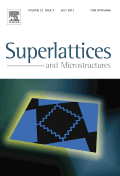
SUPERLATTICES AND MICROSTRUCTURES
Connecting scholars and professionals in materials innovation.SUPERLATTICES AND MICROSTRUCTURES is a premier journal dedicated to the exploration and dissemination of cutting-edge research in the fields of Condensed Matter Physics, Electrical and Electronic Engineering, and Materials Science. Published by Academic Press Ltd - Elsevier Science Ltd, this journal has established itself as an important platform for scholars and industry professionals to share their findings related to the design, fabrication, and application of superlattices and microstructured materials. With a commendable impact factor reflected in its rankings—positioned within the top quartile in Physics and Astronomy as well as Electrical and Electronic Engineering—it offers high visibility and influence in the academic community. The journal has covered significant contributions from 1985 to 2022, although access options have transitioned, making staying current essential for researchers and practitioners alike. This journal not only serves as a repository of knowledge but also fosters collaboration and innovation in materials science and related disciplines.
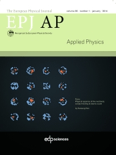
EUROPEAN PHYSICAL JOURNAL-APPLIED PHYSICS
Unlocking Potential in Electronic and Optical MaterialsEUROPEAN PHYSICAL JOURNAL-APPLIED PHYSICS, published by EDP SCIENCES S A in France, serves as a vital platform for the dissemination of cutting-edge research in the fields of condensed matter physics, electronic, optical and magnetic materials, and instrumentation. With an ISSN of 1286-0042 and E-ISSN of 1286-0050, this journal has been a valuable resource for researchers since its inception in 1998, aiming to foster innovation and dialogue among professionals and academics alike. Featuring an impact factor that reflects its growing influence, the journal is currently ranked in the Q4 quartile for several related categories in 2023, underscoring its ongoing contributions to the scientific community despite its relatively competitive positioning. Access to the journal is available through various Open Access options, ensuring that pioneering research is readily accessible to all. As it continues to evolve towards its 2024 objectives, EUROPEAN PHYSICAL JOURNAL-APPLIED PHYSICS remains dedicated to advancing knowledge and facilitating collaboration in applied physics, making it an essential resource for students, researchers, and professionals dedicated to exploring the forefront of physical sciences.
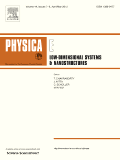
PHYSICA E-LOW-DIMENSIONAL SYSTEMS & NANOSTRUCTURES
Pioneering research in condensed matter and nanostructures.PHYSICA E-LOW-DIMENSIONAL SYSTEMS & NANOSTRUCTURES, published by ELSEVIER, is a premier journal dedicated to advancing the field of condensed matter and nanoscience, focusing on the innovative properties and applications of low-dimensional systems. With an esteemed Q2 ranking in multiple categories including Atomic and Molecular Physics, Condensed Matter Physics, and Nanoscience for 2023, this journal serves as a vital platform for researchers and professionals aiming to disseminate and discuss cutting-edge research. Established in 1974 and converging its focus from 1997 onwards, PHYSICA E captures the evolving landscape of material science, making it a crucial resource for anyone invested in the dynamics of electronic, optical, and magnetic materials. Although the journal operates on a subscription basis, its broad accessibility and significant placement within Scopus rankings—such as being in the 83rd percentile for Condensed Matter Physics—underscore its importance within the academic community. Researchers and students alike will find this journal a cornerstone for fostering knowledge and collaboration in the fields of nanotechnology and low-dimensional physics.